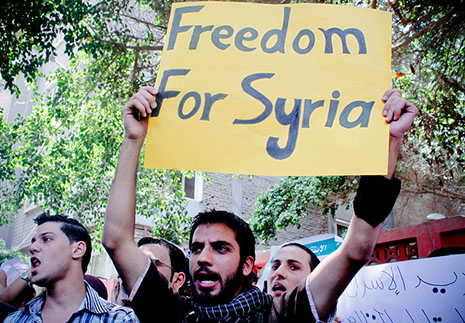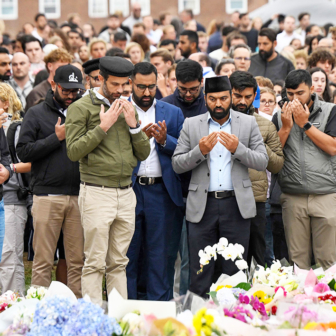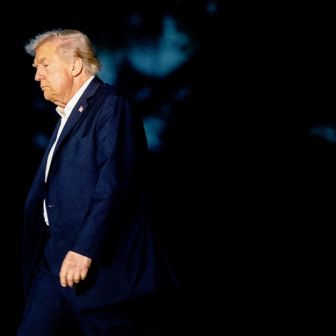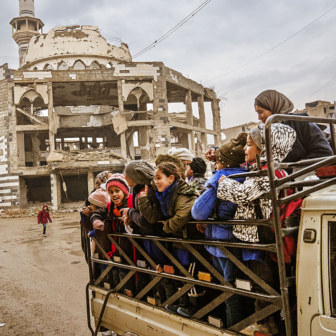IT SOMETIMES seems as though the history of the Middle East can be characterised as stasis punctuated by the very occasional burst of great change. Are we witnessing one of those rare moments of transformation? A year ago, few observers would have predicted the extent of the popular uprisings that have claimed two presidents – those of Tunisia and Egypt – and are likely to claim the leaders of Libya and Yemen as well. Few would have imagined the type of civil conflict now occurring in Libya, or the involvement of NATO warplanes in that conflict. Nor would many have guessed that Osama bin Laden – the world’s most wanted man for nearly a decade – would be killed by US special forces in a custom-made house only a few kilometres from Pakistan’s equivalent of Duntroon.
As much as this looks like an impressive array of profound changes for the region, these events are of very different orders of importance. Ultimately, bin Laden’s death is unlikely to be significant in a strategic or political sense, and any impact will depend greatly on other political happenings in the region: on whether the current protests bring real change, on how governments that survive uprisings decide to respond, even on evolving economic conditions and policies over the next year or two – not to mention how al Qaeda and other extremist groups respond to bin Laden’s death and the challenges the other events pose for them.
Bin Laden’s fate will probably turn out to be far less important for the War on Terror and for security than it might seem. It no doubt improves Barack Obama’s image at home and his re-election chances next November, although that vote is still a long way off. And it no doubt brings the satisfaction of justice and revenge for the many Americans who were personally affected by the September 11 attacks, and for the many more who saw that day as a declaration of war on America.
But that is about the extent of the benefits. Bin Laden was no longer managing al Qaeda in any operational sense, apart from having a very local influence, perhaps, or making an occasional contribution more widely. He had become a symbolic or figurehead leader of a still-important group – or actually a set of groups – but was the mascot of al Qaeda rather than its CEO.
Any plans being made by al Qaeda’s various branches and assemblages for attacks against local figures or Western targets will therefore continue without him. His death will probably not stop such attacks, but nor is it likely to increase them greatly. While it is prudent for the United States to prepare for revenge attacks, these are likely to be opportunistic or crude. Serious reprisals by al Qaeda, if they come, will not occur for some time: a professional attack with a good chance of success takes a long time to plan, prepare and implement.
More important is the fact that al Qaeda is changing; it is fragmenting and transforming, sometimes mixing with like-minded groups. Its power has indeed been eroded by the United States and its allies, as American officials often claim. The very meaning of the name al Qaeda has changed: these days, apart from referring to a core leadership in the Pakistan–Afghanistan area, it is partly a brand name used for and by various groups, and partly a catch-all for the disjointed, loosely affiliated ideological associates of bin Laden and other top figures.
These include “Al Qaeda in Iraq,” a group that once posed a real military threat to US and coalition forces in Iraq, but which is now greatly weakened by the 2006 killing of its leader Abu Mus’ab al-Zarkawi. It now faces US and Iraqi forces that are fighting it in increasingly effective ways. The main Sunni tribes in central and western Iraq have turned on the organisation – to the extent that they ever supported it very much – and it enjoys few real safe havens in areas that were, back in 2006, among the most dangerous places in the world for an American soldier. The future of Iraq is by no means certain, but Al Qaeda in Iraq’s looks increasingly bleak.
They also include “al Qaeda in the Arabian Peninsula,” with its membership mostly of Yemeni and Saudis, formed by the merger of the Yemeni and Saudi branches of al Qaeda in early 2009. The organisation claimed, before bin Laden’s death, to follow his ideas devotedly, demonstrating the likely personal and ideological links that many of its members have with bin Laden or other core figures.
A quite different example is “al Qaeda in the Islamic Maghreb.” This group was formed by the supposed merger of an Algerian extremist group, the Group for Preaching and Combat, with al Qaeda. It is less an anti-American or anti-Western group and, given its origins, is most focused on fighting the Algerian government. Its salafi origins are important as well: the salafi (meaning “predecessors” or “ancestors”) seek to emulate the earliest generations of Muslims, and thus are most often, if somewhat simplistically, described as ultra-puritans and literalists. This is somewhat in contrast to other al Qaeda figures, including bin Laden himself, who are most focused on anti-Saudi, anti-atheist and anti-American ideas, and who are not strictly salafi, even if they very often share a similarly extreme dogma.
IT MIGHT seem paradoxical, but the emergence of new al Qaeda–named groups is not a sign of health for the organisation – quite the opposite. Al Qaeda’s image and the support and sympathy it attracts in the Muslim world have been declining for some time, in many places markedly.
Research conducted by the respected Pew Research Centre for many years, most recently in 2010, illustrates the organisation’s problem. When asked whether they had “confidence” in bin Laden, only 19 per cent of Muslim respondents in Egypt said yes, significantly lower than the peak of 27 per cent in 2006. In Jordan the number was only 14 per cent, as against a peak of 61 per cent − yes, 61 per cent − in 2005. In Lebanon the figure was only 3 per cent, against 19 per cent back in 2003. Bin Laden had been losing his appeal in much of the Muslim world.
Most telling perhaps is that even in Pakistan – where bin Laden has always been assumed to enjoy considerable levels of support and where al Qaeda can operate more freely than in most Arab countries – bin Laden’s popularity has plummeted too, from 52 per cent in 2005 to 18 per cent in the 2009 and 2010 surveys.
In other words, al Qaeda has been struggling to maintain its base of support and its perceived relevance beyond a small, radicalised core. And in recent months, new challenges have emerged for the groups that now make up the organisation.
Far and away the most important have been the protests across much of the region. Very large groups of people, disproportionately secular, often young and mostly consisting of men and women protesting together, have managed to remove the leaders of Egypt and Tunisia, will probably claim the Yemeni president and Libyan leader, and have threatened several others. Al Qaeda has always promised that it would unite people and bring about change like this; not only did it fail, but when change finally did come it was dominated by political forces and ideas that were almost the opposite of al Qaeda’s.
All the current dynamics – a fragmented structure, a leadership on the run, popularly led change, new economic conditions – are serious for al Qaeda, and help explain why bin Laden’s death may prove less significant than it might have been even a couple of years ago, let alone back in 2001 or 2002. Nevertheless there remain important variations and nuances, by country, in the level al Qaeda’s support.
Support is lowest or declining most quickly where a variety of arguments and ideas compete with each other in the political realm, where the scope is greatest for people to express political views and frustration, or where economic conditions and opportunities are improving, even if only gradually and tortuously. In countries like Jordan and Egypt, and even increasingly in parts of the Gulf, the scope for political expression is now greater than it has been in the recent past.
It is also likely that the recent protests will cause many leaders to be more responsive to popular political and economic wishes and aspirations. New leaders in Tunisia and Egypt will obviously recognise and respond to the popular concerns that drove the protests in those countries. Even where old leaders remain in power, many are now on notice. If their policies and actions are more in line with public opinion then the space for extremist groups like al Qaeda to build a base of support will be greatly diminished. This was already happening when US troops stormed bin Laden’s compound last Sunday night.
Elsewhere the picture is more complicated, but no more promising for al Qaeda. In Syria, it is unclear how much sympathy for Islamists lies beneath a superficially quite secular society and political system. More moderate Islamism was probably sent into hiding, but not destroyed completely, by the government’s crackdown on opposition organisations in the 1980s, yet support for al Qaeda–type Islamism is not likely to be very strong.
In the Gulf, by contrast, al Qaeda has been running out of steam because the region is changing. Many states and cities are opening their economies, and most have fared well out of high oil prices for most of the last seven or so years. Some states, most notably Qatar, now permit considerably more political openness and discussion than they once did. Such change is, of course, not popular with everyone, and some regimes still struggle to ensure sufficient legitimacy and support, but the changes of recent years have for the most part created conditions that suit incumbent regimes and moderate politics rather than bin Laden and like-minded figures.
Yemen is probably the one exception. An autocratic leader, Ali Abdullah Saleh, has squandered the oil wealth that has flowed in over the past quarter-century, and which is quickly running out. Yet al Qaeda in the Arabian Peninsula is not anything like a mainstream organisation there. It is more popular than in some other places, but that’s probably because it can operate freely, is emphatic in the politics it preaches, is seen as relatively incorrupt, and finds some consistency with the strong traditionalism that is found in Yemen.
That said, to think that the very traditionalist tribes of Yemen are natural partners for an ideology like al Qaeda’s is to misunderstand both: even those tribes who oppose Saleh do not want to replace his authority with al Qaeda’s, and al Qaeda, even if it appreciates the training and operational freedom available in Yemen, probably does not expect to be able to convert traditional Yemenis to its ideology en masse.
WHILE bin Laden’s appeal may have been waning along with al Qaeda’s, it is still important to remember the uncertainties and risks that lie behind all these recent trends and events. Various new political forces and groups are now appearing and operating more freely than used to be possible. These include, for example, some very puritanical Islamist groups in various countries of the Middle East.
It also remains likely that the protests in which people have invested so much faith and optimism will deliver only a fraction of the change that is expected of them. Where they have removed leaders, they have still not profoundly changed the political system; in Egypt, in fact, the political change so far has been minimal. Elsewhere, leaders have appeared to respond, but if this remains more rhetoric than action then popular disappointment and anger, or further rounds of protests, are likely.
Even the more moderate Islamist elements should be viewed with caution. The Muslim Brotherhood in Egypt, for example, played little part in the uprising there and was initially seen as having gained not much, if anything, from events. But it has quietly, and elegantly, laid the groundwork for a longer-term development of its popular base and its political power, especially its legislative power. It can now operate much more freely in a political environment in which secular and moderate forces, while popular, lack the cohesion and discipline that the Brotherhood and other large Islamist parties often possess.
Once the Brotherhood is fully established as a legal political party, it will probably devote its energies to winning as many parliamentary seats as possible. This does not give it the amount of direct authority that a president still retains, but it will make it a force to be reckoned with when policies and laws are being considered and implemented.
When all these dynamics are placed together, a mixed picture emerges. Bin Laden, thankfully, was no longer the figure he was even three or four years ago, and al Qaeda too lacks the cachet and coordination of the years before and after September 11. Add in the protests of recent months and there is considerable room for optimism in and towards the Middle East – a region that once seemed immune to peaceful or profound political change and stuck in developmental and social ruts.
Still, there is a strong risk that bin Laden’s death will be overplayed – it may be satisfying to many, but is of little strategic meaning or importance – or that too much will be expected of other changes that are moving through the region. The Western world has a habit of expecting too much from the Middle East, and assuming too much about it: the stakes right now suggest that to repeat such habits would be particularly perilous. •




